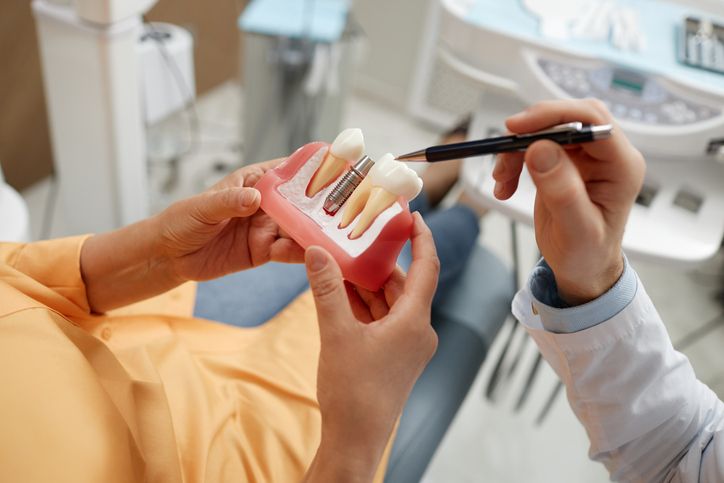Caring for Your Dental Crowns: Aftercare Guide

Dental crowns are not just a cosmetic enhancement; they're functional dental work designed to protect and restore the function of your teeth. But many may need to realize how pivotal post-procedural care is for ensuring the longevity and effectiveness of dental crown treatments.
In this detailed aftercare guide, we'll explore the steps every crown-receiving patient needs to take to guarantee their new dental investment serves them well into the future.
What is a Dental Crown?
Dental crowns are prosthetic devices cemented onto a dentist's existing teeth or implants. They cover and protect a weak tooth, restore a broken or off-colored tooth, or cover a dental implant. Once in place, they are as permanent as natural teeth and can last a lifetime with the correct care.
Upon receiving dental crowns, patients enter a crucial stage of aftercare that determines the success of their treatment. To thrive, these 'new teeth' require nurturing similar to any dental surgery. The following detailed guide will walk you through the comprehensive steps to ensure optimal dental crown care.
Understanding Dental Crown Aftercare
The success of a dental crown largely depends on how well it is taken care of immediately after the procedure and in the long term. The immediate days following the surgery are critical, as the dental cement needs time to set fully, and the tissues in your mouth need to heal.
Importance of Post-Care and Common Instructions
Proper aftercare helps prevent infections, discomfort, and dental complications. Common post-crown instructions include:
Avoid eating for the first hour after the crown has been cemented.
For the first 24 hours, avoid sticky or hard foods that could dislodge the crown or cause damage to it.
Practice good oral hygiene to protect against cavities and gum disease.
Attend follow-up visits to ensure the crown is correctly positioned, and there are no complications.
Let's dive deeper into these essential aftercare practices to understand why and how each is crucial for the well-being of your dental crowns.
Oral Hygiene Practices for Dental Crowns
Brushing and Flossing Techniques
Effective brushing is critical to keep your dental crown clean and the surrounding gum tissue healthy. Use fluoride toothpaste and a soft-bristled toothbrush. Gently brush the area around the crown at least twice daily, carefully removing any plaque and food deposits.
Flossing with Care
Flossing should always be part of your daily oral hygiene but requires specific care around dental crowns. Slide the floss down the side of your tooth and move it back and forth to remove plaque. Be sure not to pull up sharply on the floss, which can dislodge the crown.
Recommended Oral Care Products
Ask your dentist for recommendations on the best oral healthcare products for your crown. Dental experts may suggest specific toothpaste or mouthwash designed for sensitive teeth or antiseptic properties to maintain oral health without damaging the crown or the adhesive.
Diet and Nutrition
Foods to Avoid
For the first few days after getting a dental crown, it's best to avoid very hot or very cold foods and beverages, as well as hard or chewy foods that could cause pain or damage to the crown.
Recommended Foods
During this healing period, stick to a soft, bland, easy diet on the mouth. Foods like soup, smoothies, yogurt, and mashed potatoes can nourish without stressing the new crown.
Managing Discomfort and Sensitivity
Immediate Post-Op Care
It's common to experience mild discomfort or sensitivity in the initial days following a new crown placement. Over-the-counter pain medications like ibuprofen can help manage this discomfort.
Prolonged Sensitivity
Contact your dentist immediately if you experience prolonged severe pain or elevated sensitivity to hot or cold. This could be a sign of an underlying issue that requires professional care.
Regular Dental Check-ups
Follow-Up Visits
Dental crowns typically require a second visit to the dentist to ensure they fit correctly and that the patient's bite is comfortable. These check-ups are non-negotiable and must be attended to maintain the health and stability of the dental crown.
Cleaning Appointments
Subsequent regular cleanings every six months ensure that your natural teeth and crowns are free from plaque and tartar build-up, guarding against decay and further dental issues.
Signs You May Have an Issue With Your Dental Crown
Sometimes, despite your best efforts at post-crown care, complications may arise. Look out for the following signs that could indicate a problem with your dental crown:
- Pain or discomfort when biting down or chewing.
- Sensitivity to cold or hot foods and beverages.
- Visible cracks, chips, or damage to the crown.
If you experience these symptoms, contact your dentist immediately for a follow-up appointment at Severns Dentistry & Orthodontics.
Questions About Dental Crown Care?
Ensuring the years of service from your dental crowns involves disciplined adherence to the aftercare instructions provided by your dentist. Remember, dental crowns are strong but not indestructible and require thoughtful treatment to extend their life and protect your overall oral health.
With a commitment to meticulous oral hygiene practices, a cautious eye on what you consume, and a proactive approach to any discomfort or issues, you'll be taking the best course of action to secure the health and beauty of your dental crowns for years to come.
Your dental crown is a significant investment and a critical part of your oral health. By understanding and following this aftercare guide, you're not only doing your part to ensure your crown's success but also contributing to a radiant, confident smile that lasts a lifetime.
At Severns Dentistry & Orthodontics, we are dedicated to providing our patients with top-quality dental care and the necessary information to maintain optimal oral health. We provide attentive and expert dental crown procedures for our patients in McMurray and beyond.
If you have questions about caring for your dental crowns or want to make an appointment, call Severns Dentistry & Orthodontics today!

Author:
Natalie Severns, DMD
Upon graduating from the University of Pittsburgh School of Dental Medicine, Dr. Severns specialized in Orthodontics and Dentofacial Orthopedics at the University of Pittsburgh School of Dental Medicine. She then did an externship in London, England, at the prestigious Guy’s Hospital. At this hospital, she learned top therapies in Dentofacial Orthopedics to provide her patients with the best possible facial esthetics.
Blog










